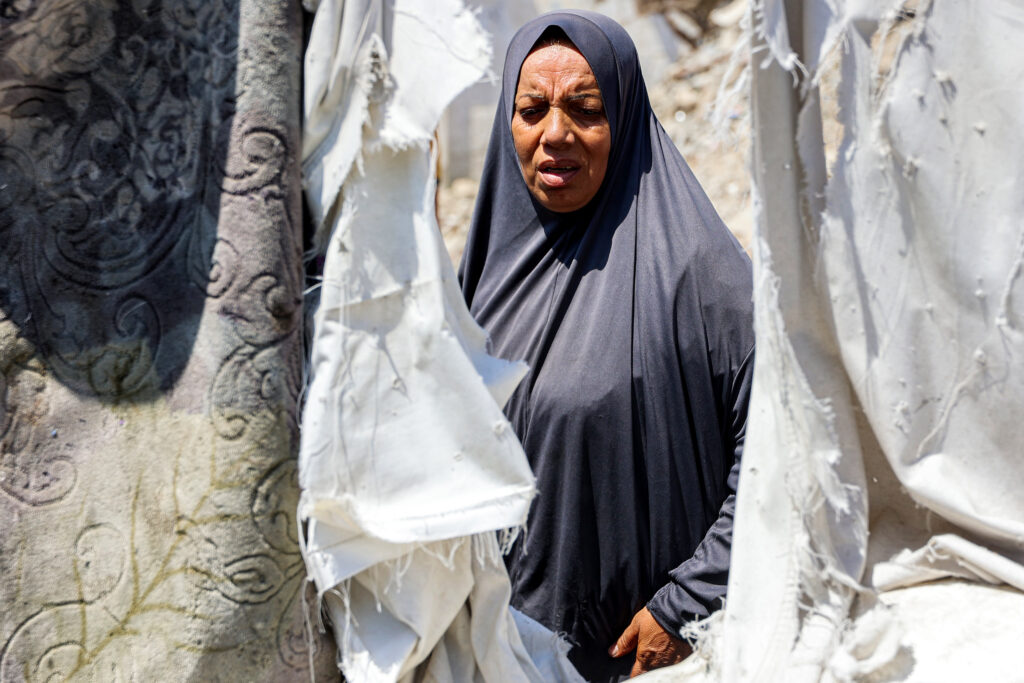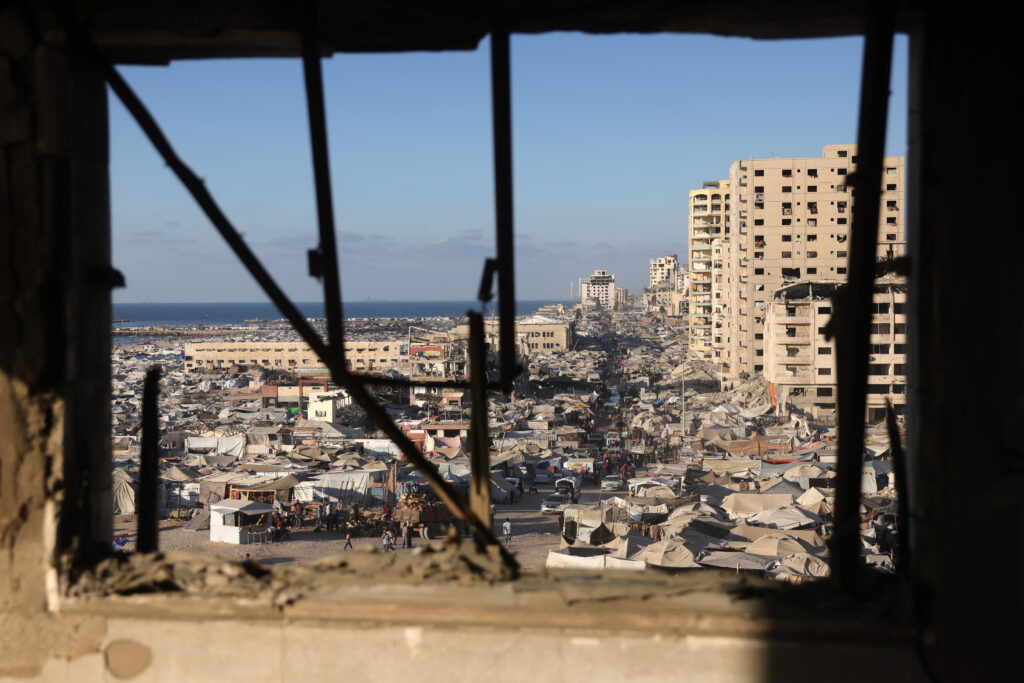AFP Asia Business
Gaza civil defence says Israeli fire kills 44
Gaza’s civil defence agency said Israeli forces killed at least 44 people on Thursday, including 25 in Gaza City where the military has increased bombardments ahead of a planned offensive.Nearly two years into the devastating conflict, Israel has built up its forces in recent days, with troops operating on the outskirts of Gaza City, the Palestinian territory’s largest urban centre.The United Nations estimates that nearly one million people live in and around Gaza City in the territory’s north, where it has declared famine.A senior Israeli military official told journalists on Wednesday that authorities expected the new offensive to capture Gaza City to lead to mass displacement, estimating that a million Palestinians would flee south.Civil defence spokesman Mahmud Bassal said that an Israeli air strike on Thursday hit a tent sheltering a a displaced Palestinian family in Gaza City, killing five people including three children.Contacted by AFP, the Israeli military requested timeframes and coordinates to comment on specific incidents.In Tel al-Hawa, the neighbourhood in Gaza City’s west where the strike reported by the civil defence took place, AFP footage showed Palestinians outside damaged tents, clearing up scattered belongings.A pair of blood-stained pink slippers lay amongst the debris.Israa al-Basous, who lives there, recounted seeing the tent next to hers on fire.”My children and I were sleeping in the tent when we heard the sound of bombing. Shrapnel fell on us, and my four children started screaming,” she told AFP.At Gaza City’s Al-Shifa Hospital, where the dead and wounded were being received, bodies wrapped in white shrouds lay on the floor of the hospital’s morgue.One woman stroked the head of her dead son as his body lay outside on a stretcher.”Who are you leaving me to, son? Why? Why?” she wept.Further south, in the Nuseirat refugee camp, the civil defence said an Israeli air strike killed seven people including three children.AFP footage from Nuseirat showed Palestinian man Yousef Suleiman with his granddaughter, walking through a bombed-out shelter where tattered scraps of material hung from tent poles.Suleiman said the pre-dawn strike killed his nephew, the nephew’s wife and their two children.”The entire tent was destroyed, along with everyone inside,” he said.Media restrictions in Gaza and difficulties in accessing many areas mean AFP is unable to independently verify the tolls and details provided by the civil defence agency or the Israeli military.The war in Gaza was sparked by Hamas’s October 2023 attack on Israel, which resulted in the deaths of 1,219 people, mostly civilians, according to an AFP tally based on Israeli figures.Israel’s retaliatory offensive has killed at least 64,231 Palestinians, most of them civilians, according to figures from the health ministry in Hamas-run Gaza that the United Nations considers reliable.
Coffee and cash: how Hamas pays its civil servants in secret
One of thousands of public servants in Gaza’s Hamas-run government, Karim, a public works ministry employee, received what seemed like an ordinary message on his phone: an invitation “for a coffee”.The text gave a time for a meeting near a school sheltering displaced people amid the wreckage and rubble of nearly two years of war between Hamas and Israel in the Palestinian territory. Karim, who like others interviewed by AFP asked to use a pseudonym, explained how he went to the meeting in July terrified of a possible Israeli attack, but found “an employee I knew waiting for me”.He “gave me 1,000 shekels ($298),” the 39-year-old said, adding that that was only part of his pre-war salary of 2,900 shekels.The war has destroyed public infrastructure and put most government employees out of work, but testimonies gathered by AFP from civil servants confirm Hamas is still paying some salaries, at least in part and with delays.Israel has dealt a series of body blows to Hamas and its institutions over the past two years, decimating the Palestinian Islamist movement that seized total control of Gaza in 2007.In response to Hamas’s unprecedented attack on Israel on October 7, 2023, the Israeli army launched an offensive against the group, which according to the health ministry in the Gaza Strip has killed at least 63,746 people.Residents in Gaza explained they try to avoid being close to people linked to Hamas or its fighters, for fear of the Israeli military locating and targeting them with strikes that often kill or injure those around them.According to witnesses, the army has repeatedly targeted people sent by Hamas to deliver salaries.- ‘Escaped death’ -Alaa, a teacher at a public school in Gaza City, last received a salary in June.The mother of five had received a text message asking her to go to a school sheltering displaced people in northern Gaza.When she arrived, “the school had just been bombed and the employee in charge of distributing salaries had fled. Thank God I was late, I escaped death.”She had to return to the area the next day to receive her salary, she said.The Israeli army regularly carries out strikes on schools, where displaced people shelter, accusing fighters from Hamas and other militant groups of using them as bases and command posts.Before the war, Hamas’s government employed an estimated 40,000 people, drawing from revenue from customs duties and taxes to run public services.From 2021 until the start of the war in Gaza in 2023, Qatar pledged $360 million in annual funding to the Palestinian territory, at Israel’s request, which included salaries of civil servants such as doctors and teachers. Doha has denied providing financial aid to Hamas.Hamas officials had claimed, before the war in Gaza, to have received financial support from Iran, though the Islamic republic has never confirmed providing funds.According to an official familiar with the matter in Gaza who spoke to AFP on condition of anonymity, Hamas obtained cash mainly through smuggling via tunnels dug near the border or by sea, despite Israel’s blockade.In February 2024, the Israeli army released videos of safes and bags containing large sums of money (in shekels, US dollars and Jordanian dinars) that it said it had discovered in tunnels under Gaza, along with documents it claimed proved cash transfers from Iran to Hamas.Jamil, 43, an accountant at a government institution, told AFP Hamas “stored hundreds of millions of dollars in tunnels or safe places for difficult times such as war”, without providing further details.- ‘Mafia’ -The Israeli military has hit Hamas’s infrastructure and targeted financial leaders like Ismail Barhoum, who was killed in March in an Israeli strike.Israel has “bombed Hamas-owned banks, places where money was stored, and assassinated financial system officials, but that didn’t stop the process,” he said.According to a Hamas source who spoke to AFP on condition of anonymity, senior officials receive their salaries in secret where they live, in displacement camps or schools turned shelters, “so as not to be exposed to strikes.”Jamil explained the salary payment process is “very complex”, changing according to the security situation. Hamas “is keen to pay part of the salaries as soon as the funds are available”, he added.But officials interviewed by AFP complain their wages are not enough to meet basic needs, in a territory where the UN declared famine last month.Others complained that only civil servants who are members of Hamas get paid.Massoud, an officer in the Hamas police force, said he recently received a message on his wife’s phone inviting him to “have tea”. His wife was pleasantly surprised, grateful that his salary had arrived.But the money “is not enough to eat, and we are hungry,” he told AFP.”We’re with the resistance,” he said of Hamas, but added the group should have been “prepared for such hellish times”.Abdallah, 38, a teacher, last received his salary (950 shekels) in July, stretching it, like most Gazans who still manage an income, to feed 20 extended family members after his three brothers were killed near aid distribution sites.”I said goodbye to my wife and children without telling them I was going to get my salary.” This way of being paid is “painful, it’s like you’re working for the mafia.”
France’s Ozon under the gun with big screen take on Camus classic
French director Francois Ozon has dared to do what so many other filmmakers have shied away from — adapting one of French literature’s most-read classics, Albert Camus’s “The Stranger”, for the big screen.The “8 Women” director said this week he had rediscovered Camus’s 1942 novel after first reading it in school like so many other French teenagers — but not really understanding its deeper absurdist meaning.”I was shocked reading it because the book was still so strong, so powerful, so mysterious and so I was excited,” Ozon told journalists at the Venice Film Festival where “The Stranger” premiered on Tuesday.”It was a big challenge because when I decided to make it, so many French people told me, ‘It’s my favorite book, I’m curious to see what you will do’, so it was a big pressure.”Ozon said it was crucial to bring a more contemporary view to the novel, which takes place in 1930s Algeria under French colonialism, where Meursault, the Algerian-born French protagonist, kills an Arab man, who is never named in the book. It was “impossible” for the Arab victim to remain nameless, said Ozon, who gives him a name in the film while fleshing out the character of his sister, whose honour the murdered man tried to defend.”It was important to give a name to this man who is dead because during the trial (of Mersault), we never speak about him,” he said.He said that choice was “political, especially today where there is a real invisibility of the victims in Gaza, for example.”The only other well-known film version of “L’Etranger”, whose stage adaptation is a fixture in French theatres, is a 1967 film by Italian maestro Luchino Visconti starring Marcello Mastroianni.Ozon said he told Camus’s daughter Catherine that a too-faithful rendering of the book — as he believes Visconti did — would not work. “I said to her, ‘We have to look at the story with the eyes of today.’ It’s impossible to follow the book like someone in 1942,” he told AFP.- Colonial tensions – Filmed in Morocco and starring Benjamin Voisin as the detached Meursault — who is sentenced to be beheaded for his crime — Ozon’s “The Stranger” is set under a blinding sun and shot in black and white.”For me it was quite obvious to shoot in black and white, to show the sun… to have something very abstract, very pure and not to be disturbed by colours,” Ozon said. The film begins with archival footage of Algiers — images of the wealthy white French elite in Algeria contrasted with those of Algerians — that hint at the tensions simmering just under the surface of colonial rule. “I wanted to be realistic about the situation in Algeria. I wanted to show both communities. I wanted to show that these two communities live side by side,” he said.The Hollywood Reporter said Camus’s classic “works splendidly on the page but does not necessarily translate well to the screen.”Yet it said Ozon’s new adaptation “gets many, many things right”.Variety called it “a superb portrait of disaffection”.



